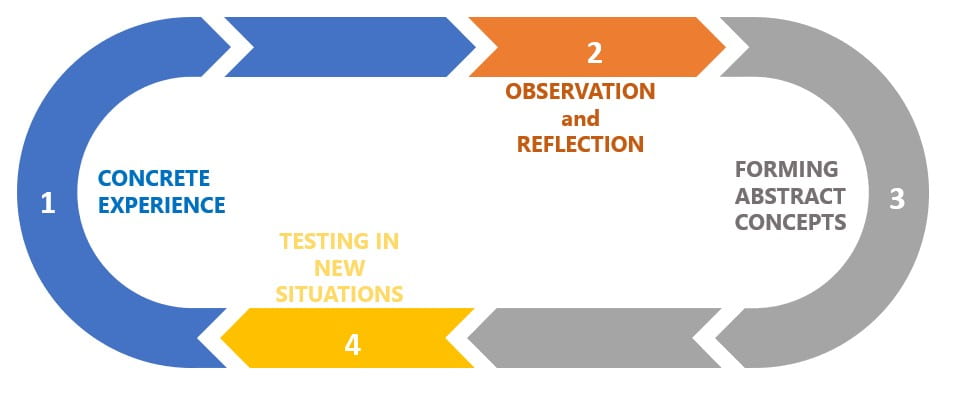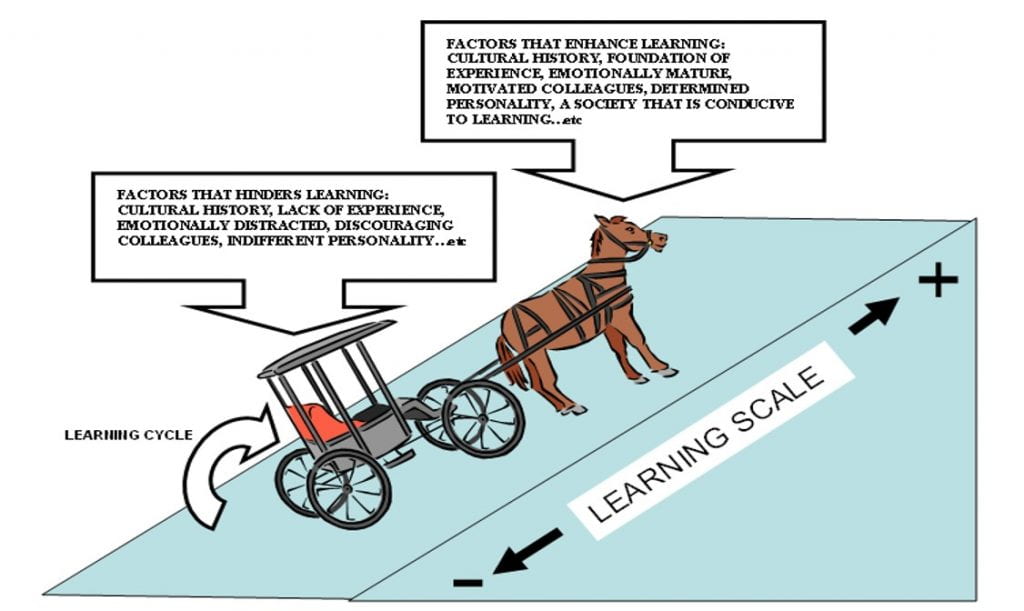The worthiness of any activity, among others, depends on the individual experiencing it. One of the gauges to measure experience’s worthiness is whether the person engaged in it learnt from it or not. This handout aims to explain what experiential learning all is about. The emphasis is on how ‘four-stage learning cycle’ works in experience-based learning. Furthermore, critical analyses on the propositions forwarded by some well-known educational experts that are influential in experiential learning will also be discussed. However, the link between experiential learning and how the human brain functions is not part of this handout. Also, this handout excludes critiques on experiential learning perspective, 2-stage, 3-stage, or 5-stage learning cycles, and learning styles.
Learning from experience is commonly known as “Experiential Learning” (EL). Weil and McGill (1989) clustered those people who see EL in different angles into four categories called “villages”. Village one, are those people who see EL as a tool for recognizing the prior learning of an individual to advance in his career or education. Village two are those educators who structure curriculum in post-secondary education based on EL. Village three are the ones trying to change the society through EL. Lastly, village four are those engaged in personal and teamwork developments through EL approaches. Even though these village people perceive EL with different meanings, in one way or another, their learners follow Kolb’s established model of experiential learning as well as the village people themselves when they learn something from experience.
There are several variations in means of representing the sequence of EL, however the most widely used is the one of Kolb’s (Greenaway, 2004). According to Kolb (1984, p.41),” learning is the process whereby knowledge is created through the transformation of experience”. Ideally, the cycle begins with the learner being involved in some sort of material or human activity where his bodily functions are at work – concrete experience. The second stage is a process where his senses extract those instances, and the mind begins to form an image of the experience – observation and reflection. Then those images will be abstracted to become new ideas or new concepts – abstract conceptualization. Then and only then, this new acquired concept can be tried again in similar instance or maybe in different instance but within the range of generalization, which in this case the new concept is said to be a ‘general principle’ (Smith, 2001).
Kolb and Fry (1975 cited in Smith 2001) also argue that learning cycle could initiate in any of the four stages and the cycle should progress in a continuous spiral. Whether the learning cycle starts at 1 or at any point in the 4 stages shown below (Figure 2), experience in general, plays a vital role in adult learning and education.

In fact, most adult educators make use of experience in their teaching and learning techniques such as simulations, role plays, or games. However, as the learning cycle suggests, undergoing the experience alone is not educational, one must contemplate, thoroughly understand, and derive conclusions from the experience (Pinn, 2005, p.32).
Moreover, other than the learners’ effort to learn, Boud, Cohen and Walker (1993) enumerated four propositions, among others, which discuss significant factors that influence the learning cycle. Considerations of these factors will somehow make a difference in practicing one’s teaching profession in the future.
One of the propositions is “learners actively construct their experience”. Different learners in the same training session will construct their experience differently. The learners’ construction of experience depends on their expectations, knowledge, attitudes, and emotions. As Boud and Walker (1990) have stated that construction of any learning activities is influenced by the learner’s personal foundation of experience or learner’s personal and cultural history. This presupposes that an educator shall acknowledge the learners’ predisposition in constructing their learning experience. Otherwise, as it could possibly happen, an exciting lecture to one learner might be boring to another.
The second among the propositions states that “learning is a holistic process”. Learning domains are classified as cognitive (thinking), affective (values and feeling) and psychomotor or conative (action and doing). Although one (or two) of these domains can be considered dominant in each learning situation, ‘other learnings’ could also occur. These learnings may not be defined explicitly in training objectives and yet may still modify the participants’ beliefs, outlook, tendencies, or feelings (Pinn, 2005, p.27)
The third, “learning is socially and culturally constructed”. The society where one grew up and the culture that molded one’s beliefs, reasoning, feeling, and language play a significant role in one’s capacity to learn. Learning then does not exist independent of environment – social setting and range of cultural values (Boud, Cohen and Walker, 1993, p.14). For example, an educator would need more effort (and perhaps external help) to teach existence of God in a completely pagan world than in the world with more receptive learners.
Last but not the least, “learning is influenced by the socio-emotional context in which it occurs”. Boud and his colleagues (1993, p.15) stated that “denial of feelings is a denial of learning”. Learning from experience, in this case, is influenced by learner’s self-esteem and confidence. In addition, the support and trust from the other learners also influence individual learning experience. One of the implications of this proposition is that the attitude of the learner towards the experience affects other learners’ learning experience – encouraging or discouraging.
Clearly, the learner’s foundation of experience, cultural history, feelings or emotions, other learners’ motivation and the environment are some of factors that could significantly affect the learning cycle (see figure 3 below) – enhance or hinder. I am convinced that as an educator, it is paramount that one should not take for granted the learner’s personality and cultural history. One should also be aware of the learner’s emotion and disposition, as well as that of his colleagues, while engaging in any learning activity. Although it may seem difficult and unnecessary but considering these factors while facilitating an experience – based training shall make the learning activity worthwhile not only for the learners but for the educator as well.
